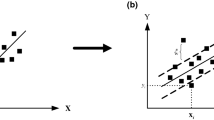Abstract
This paper derives a novel nominal state relationship (NSR) by using support vector machines (SVM). By using the NSR, a novel sliding surface which has the dynamics of a nominal system controlled by pole placement is proposed. The sliding mode control (SMC) with this novel sliding surface gives its robustness to pole placement control systems with uncertainties.
Similar content being viewed by others
References
U. Itkis, Control Systems of Variable Structure, John Wiley & Sons, 1976.
V. I. Utkin, Sliding Modes and Their Application in Variable Structure Systems, Mir Publishers, 1978.
H. Yu and U. Ozguner, “Adaptive seeking sliding mode control,” Proc. of the American Control Conference, pp. 6, June 2006.
L.-C. Hung, C.-Y. Wang, and H.-Y. Chung, “Sliding mode control for uncertain time-delay systems with sector nonlinearities via fuzzy rule,” Proc. of IEEE Systems, Man and Cybernetics, vol. 1, pp. 251–256, Oct. 2005.
S. K. Park and H. K. Ahn, “Robust controller design with novel sliding surface-linear optimal control case,” IEE Proc. of the Control Theory and Applications, vol. 146, no. 3, pp. 242–246, 1999.
D. J. Sebald and J. A. Bucklew, “Support vector machine techniques for nonlinear equalization,” IEEE Trans. on Signal Processing, vol. 48, no. 11, pp. 3217–3226, Nov. 2000.
H. Peng and J. Wang, “Nonlinear system identification based on multi-resolution support vector regression,” Neural Networks and Brain, vol. 1, pp. 240–243, Oct. 2005.
A.-M. Wang, H.-B. Cui, and Z.-M. Yang, “Algorithm research on fuzzy linear separable support vector classifier,” Proc. of the Wireless Communications, Networking and Mobile Computing, pp. 1–4, Oct. 2008.
C.-C. Yao and P.-T. Yu, “Effective training of support vector machines using extractive support vector algorithm,” Proc. of the Machine Learning and Cybernetics, vol. 3, pp. 1808–1814, Aug. 2007.
X. Li and L. Shu, “Fuzzy theory based support vector machine classifier,” Proc. of the Fuzzy Systems and Knowledge Discovery, vol. 1, pp. 600–604, Oct. 2008.
S. R. Gunn, Engineering Science and Mathematics School of Electronics and Computer Science, SVM toolbox available at http://www.isis.ecs.soton.ac.uk/resources/svminfo/.
Author information
Authors and Affiliations
Corresponding author
Additional information
Recommended by Editorial Board member Guang-Hong Yang under the direction of Editor Jae Weon Choi. This work was supported by grant No.RTI04-01-03 from the Regional Technology Innovation Program of the Ministry of Commerce, Industry and Energy (MOCIE) and the Second Stage of Brain Korea 21 Projects.
Wang Fa Guang received the B.S. degree in Automation Control Engineering from Huazhong University of Science and Technology, Wuhan, China, in 2006 and the M.S. degree in Electrical Engineering from Changwon National University, Korea, in 2008. He is currently working toward a Ph.D. in Electrical Engineering from Changwon National University, Korea. His research interests include nonlinear control, adaptive control, and system identification.
Min Chan Kim received the B. S., M. S. and Ph.D. degrees in Electrical Engineering from Changwon National University in 1996, 1998 and 2003, respectively. From 2006 to 2009, he was a research professor under the Brain Korea 21 Project Corps at Changwon National University. His research interests include H ∞ robust control, sliding mode control, system identification.
Seung Kyu Park received the B.S., M.S. and Ph.D. degrees in Electrical Engineering from Korea University in 1984, 1986, and 1990, respectively. Since 1990, he has been with the department of Electrical Engineering at Changwon National University, Korea, where he is currently a professor. He was a visiting professor in University of Strathclyde, Scotland in 1995 and in University of Wisconsin at Madison in 2003, respectively. His research interests include robust control, nonlinear control, fuzzy control, and their applications in power electronics and robots.
Gun Pyong Kwak received the B.S., M.S. and Ph.D. degrees in Electrical Engineering from Korea University in 1982, 1985, and 1990, respectively. Since 1998, he is a professor of the department of Electrical Engineering at Changwon National University, Korea. His research interests include robust control and sliding mode control.
Tae Sung Yoon received the B.S., M.S. and Ph.D. degrees in Electrical Engineering from Yonsei University in 1978, 1980, and 1988, respectively. He worked with the Department of Electrical Engineering at the 2nd Naval Academy, Jinhae, Korea, as a member of the teaching staff from 1980 to 1983. He worked with the Department of Electrical Engineering at Vanderbilt University, Nashville, as a Visiting Assistant Professor from 1994 to 1995. Since 1989, he has been with the department of Electrical Engineering at Changwon National University, Korea, where he is currently a Professor. His research interests include robust filtering, mobile robotics, and signal processing.
Ho Gyun Ahn received the B.S., M.S. and Ph.D. degrees in Electrical Engineering from Korea Univeersity in 1981, 1989, and 1992, respectively. Since 1992, he is a professor of the department of Electrical Engineering at Changwon National University, Korea. His research interests include power electronics, motor control, and alternative energy.
Rights and permissions
About this article
Cite this article
Wang, F.G., Kim, M.C., Park, S.K. et al. Nominal state relationship with support vector machines and its sliding mode control application. Int. J. Control Autom. Syst. 7, 899–904 (2009). https://doi.org/10.1007/s12555-009-0604-y
Received:
Revised:
Accepted:
Published:
Issue Date:
DOI: https://doi.org/10.1007/s12555-009-0604-y




